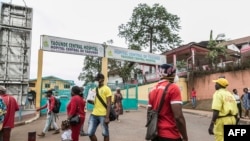Cameroon has eased restrictions put in place to curb COVID-19, which has caused 1,900 confirmed infections and 63 deaths in the country — the highest in Central Africa. But the return to normal operations for restaurants and public transportation comes as Cameroon's neighbors have refused to grant access to people crossing the border.
Cameroon Prime Minister Joseph Dion Ngute, speaking Thursday on state radio and TV, said measures taken to contain COVID-19 have helped, but have created economic and social hardships, especially in the transport, hotel and catering sectors.
"The actions taken by the government to contain this pandemic are beginning to bear fruits," Ngute said. "Although screening tests reveal new cases of coronavirus-positive patients, the number of people declared healed of this disease in our country has been on the rise. Furthermore, the mortality rate from this virus remains low."
Ngute said bars, restaurants and leisure facilities can now operate after 6 p.m., if customers and users respect safety measures such as wearing protective masks and staying at least two meters apart.
Ngute also announced tax forgiveness, financial assistance to companies, and increases in family allowances and old age pensions as compensations for the effects of COVID-19.
As Ngute was speaking, neighboring Chad, Central African Republic, Equatorial Guinea, and Gabon announced that they were protecting their populations from the spread of COVID-19 by refusing to grant entry to people traveling from Cameroon.
Justo Javier Ndong Engono, governor of Equatorial Guinea's Kie Ntem Province that shares a boundary with Cameroon, said on Equatorial Guinea state TV that Cameroonians would not be allowed into the region, and that Equatorial Guineans who are returning from Cameroon would be quarantined at the border for two weeks to certify that they are not infected by COVID-19.
Truck driver Didier Ntsama said he was delivering supplies from Cameroon to the landlocked CAR, but was refused access to CAR at the Cameroon border town of Garoua Boulay. Speaking via a messaging app, he said his truck was disinfected and handed to a CAR driver while he was asked to wait at Garoua Boulay.
He said he was told that Cameroon has the highest number of confirmed COVID-19 cases in Central Africa, so CAR would not admit any Cameroonian into its territory until the spread of the virus is contained. The rule violates his rights, he said, because drivers of CAR nationality are allowed to transport goods from Cameroon into their home country.
Cameroon has also announced that schools will reopen June 1, 2020, but that the country's Labor Day on May 1 and national day on May 20 will not be celebrated.






